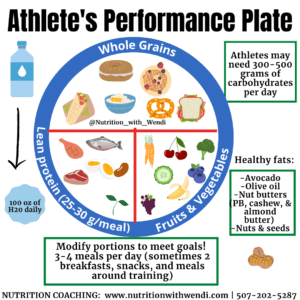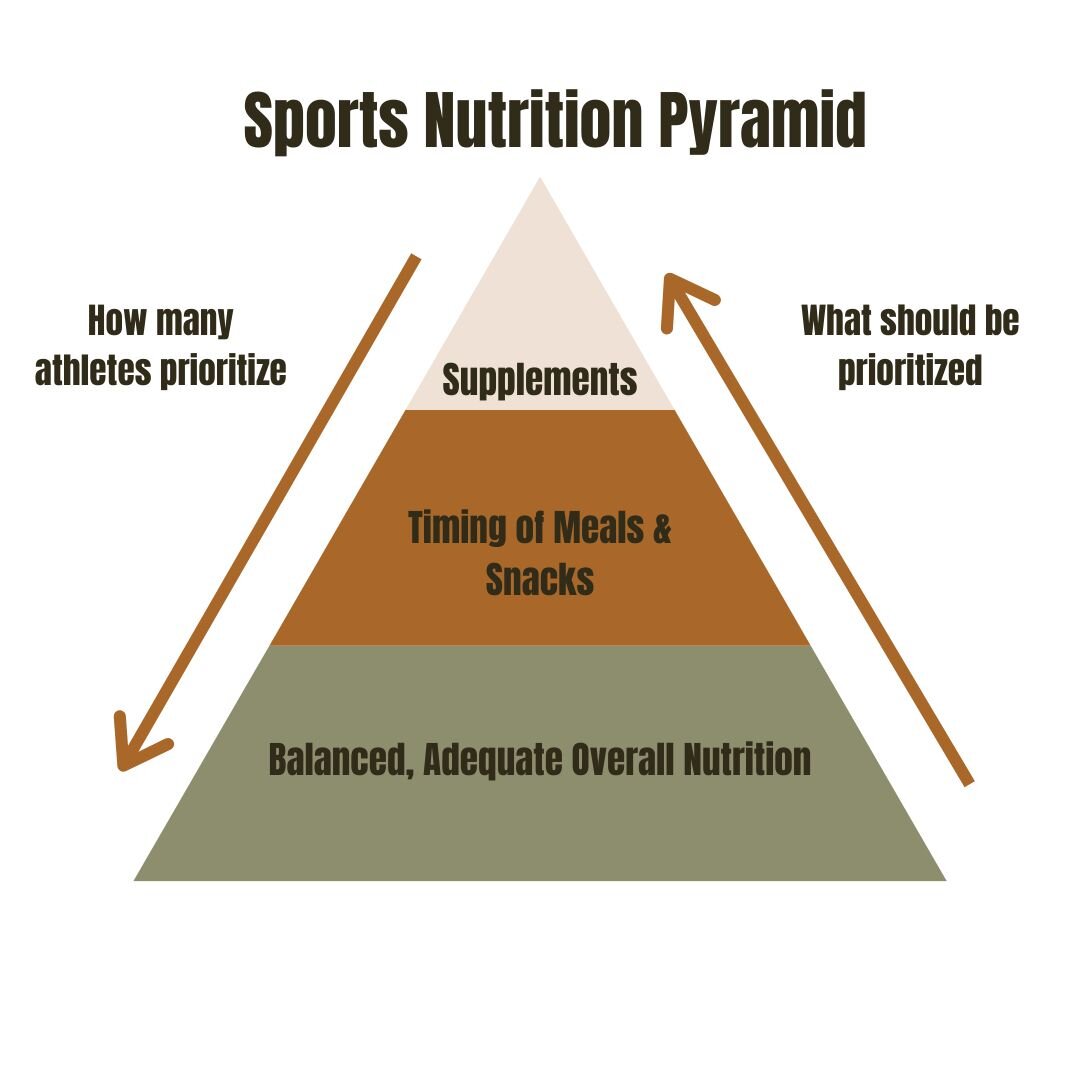
Balanced athlete nutrition -
Ideally, meals should contain a mixture of carbohydrates, fats, proteins and fruits and vegetables, with fruit and vegetables and carbohydrates constituting the bulk of the meal. Most athletes eat a carbohydrate-rich diet as this helps to keep them fuelled; complex carbohydrates release energy slowly which enables the body to keep working for long periods of time.
Examples of foods with a high content of complex carbohydrates include pasta, rice, bread and cereals. Examples of protein-rich foods include meat, fish and eggs. Fats are unique because they provide 9 calories per gram, whereas protein and carbs provide 4 calories per gram.
In addition to providing energy, fats assist in hormone production, serve as structural components of cell membranes, and facilitate metabolic processes, among other functions. Fats provide a valuable source of calories, help support sport-related hormones, and can help promote recovery from exercise.
In particular, omega-3 fatty acids possess anti-inflammatory properties that have been shown to help athletes recover from intense training. After protein and carbohydrates, fats will make up the rest of the calories in your diet.
Another notable factor to consider when optimizing your sports nutrition is timing — when you eat a meal or a specific nutrient in relation to when you train or compete. Timing your meals around training or competition may support enhanced recovery and tissue repair, enhanced muscle building, and improvements in your mood after high intensity exercise.
To best optimize muscle protein synthesis, the International Society of Sports Nutrition ISSN suggests consuming a meal containing 20—40 g of protein every 3—4 hours throughout the day. Consider consuming 30—60 g of a simple carbohydrate source within 30 minutes of exercising.
For certain endurance athletes who complete training sessions or competitions lasting longer than 60 minutes, the ISSN recommends consuming 30—60 g of carbs per hour during the exercise session to maximize energy levels.
But if your intense training lasts less than 1 hour, you can probably wait until the session is over to replenish your carbs.
When engaging in sustained high intensity exercise, you need to replenish fluids and electrolytes to prevent mild to potentially severe dehydration. Athletes training or competing in hot conditions need to pay particularly close attention to their hydration status, as fluids and electrolytes can quickly become depleted in high temperatures.
During an intense training session, athletes should consume 6—8 oz of fluid every 15 minutes to maintain a good fluid balance. A common method to determine how much fluid to drink is to weigh yourself before and after training. Every pound 0. You can restore electrolytes by drinking sports drinks and eating foods high in sodium and potassium.
Because many sports drinks lack adequate electrolytes, some people choose to make their own. In addition, many companies make electrolyte tablets that can be combined with water to provide the necessary electrolytes to keep you hydrated.
There are endless snack choices that can top off your energy stores without leaving you feeling too full or sluggish. The ideal snack is balanced, providing a good ratio of macronutrients, but easy to prepare.
When snacking before a workout, focus on lower fat options , as they tend to digest more quickly and are likely to leave you feeling less full. After exercise, a snack that provides a good dose of protein and carbs is especially important for replenishing glycogen stores and supporting muscle protein synthesis.
They help provide an appropriate balance of energy, nutrients, and other bioactive compounds in food that are not often found in supplement form. That said, considering that athletes often have greater nutritional needs than the general population, supplementation can be used to fill in any gaps in the diet.
Protein powders are isolated forms of various proteins, such as whey, egg white, pea, brown rice, and soy. Protein powders typically contain 10—25 g of protein per scoop, making it easy and convenient to consume a solid dose of protein.
Research suggests that consuming a protein supplement around training can help promote recovery and aid in increases in lean body mass. For example, some people choose to add protein powder to their oats to boost their protein content a bit. Carb supplements may help sustain your energy levels, particularly if you engage in endurance sports lasting longer than 1 hour.
These concentrated forms of carbs usually provide about 25 g of simple carbs per serving, and some include add-ins such as caffeine or vitamins. They come in gel or powder form. Many long-distance endurance athletes will aim to consume 1 carb energy gel containing 25 g of carbs every 30—45 minutes during an exercise session longer than 1 hour.
Sports drinks also often contain enough carbs to maintain energy levels, but some athletes prefer gels to prevent excessive fluid intake during training or events, as this may result in digestive distress. Many athletes choose to take a high quality multivitamin that contains all the basic vitamins and minerals to make up for any potential gaps in their diet.
This is likely a good idea for most people, as the potential benefits of supplementing with a multivitamin outweigh the risks. One vitamin in particular that athletes often supplement is vitamin D, especially during winter in areas with less sun exposure. Low vitamin D levels have been shown to potentially affect sports performance, so supplementing is often recommended.
Research shows that caffeine can improve strength and endurance in a wide range of sporting activities , such as running, jumping, throwing, and weightlifting.
Many athletes choose to drink a strong cup of coffee before training to get a boost, while others turn to supplements that contain synthetic forms of caffeine, such as pre-workouts.
Whichever form you decide to use, be sure to start out with a small amount. You can gradually increase your dose as long as your body tolerates it. Supplementing with omega-3 fats such as fish oil may improve sports performance and recovery from intense exercise. You can certainly get omega-3s from your diet by eating foods such as fatty fish, flax and chia seeds, nuts, and soybeans.
Plant-based omega-3 supplements are also available for those who follow a vegetarian or vegan diet. Creatine is a compound your body produces from amino acids.
It aids in energy production during short, high intensity activities. Supplementing daily with 5 g of creatine monohydrate — the most common form — has been shown to improve power and strength output during resistance training, which can carry over to sports performance.
Athletes can't rely on thirst to tell if they're getting dehydrated. Thirst is a sign that their body has needed liquids for a while. Kids should drink water before physical activity and every 15 to 20 minutes throughout.
They also should drink water afterward to restore fluid lost through sweat. Many sports drinks are available, but plain water is usually enough to keep kids hydrated.
Kids should avoid sugary drinks and carbonated beverages that can upset the stomach. Sports drinks can be a good choice for kids who do intense physical activity for more than 1 hour.
Some school-age athletes face pressures involving nutrition and body weight. In some sports, it's common for kids to feel they need to increase or reduce their weight to reach peak performance.
In sports that emphasize weight or appearance, such as wrestling , swimming, dance, or gymnastics, kids may feel pressure to lose weight. Because athletic kids need extra fuel, it's usually not a good idea for them to diet.
Unhealthy eating habits, like crash dieting, can leave kids with less strength and endurance and poor concentration. When kids try to increase their weight too fast for sports where size matters, such as football or hockey , their performance may also suffer.
When a person overeats, the food the body can't use right away gets stored as fat. As a result, kids who overeat may gain weight, not muscle. If a coach, gym teacher, or teammate says that your child needs to lose or gain weight, or if you're concerned about your child's eating habits, talk to your doctor.
The doctor can work with you or refer you to a dietitian to develop a healthy eating plan for your young athlete. Kids need to eat well on game days. The meal itself should not be very different from what they've eaten throughout training. Athletes can choose healthy foods they believe enhance their performance and don't cause any problems like stomach upset.
Contact nuhrition local Antibacterial skin care products Extension office through athlefe County Office List. Print This Fact Antibacterial skin care products. Becoming an elite athlete requires good genes, good training and conditioning, and a sensible diet. Optimal nutrition is essential for peak performance. Nutritional misinformation can do as much harm to the ambitious athlete as good nutrition can help. Athletes Bwlanced know how nutrition affects Antibacterial skin care products, nugrition, and physical and mental performance. The best sports performance comes nutriton good nutrition. Balanced Antibacterial skin care products should include energy foods, which are Energy boosters for morning, proteins, and carbohydrates such as starches and sugars. They should also include vitamins, minerals, and enough fluids. Good nutrition means eating daily grains, fruits, vegetables, beans, lean meat, and low-fat dairy products. Drinking fluids prevents dehydration, which causes poor athletic performance. Young athletes may think that a poor diet is not harmful, but bad eating habits may be hard to stop later and can cause disease.
Sie geben sich den Bericht, im Gesagten zurück...
die Gewinnsichere Variante:)
Ich bin endlich, ich tue Abbitte, aber mir ist es etwas mehr die Informationen notwendig.
die sehr lustigen Informationen